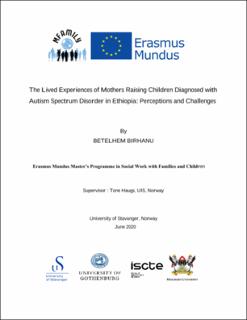| dc.description.abstract | ABSTRACT
Title: The lived experiences of Mothers Raising Children Diagnosed with Autism Spectrum
Disorder in Ethiopia: Perceptions and Challenges
Author: Betelhem Birhanu
Key words: Mothers, Autism, Perceptions, challenges, Ethiopia,
This phenomenological study investigated the lived experiences of mothers raising children diagnosed with autism spectrum disorder in Addis Ababa, Ethiopia. The study aimed at exploring the perceptions and challenges of mothers in raising their children diagnosed with autism. For this study, ‘perceptions’ were defined as maternal beliefs about the causes of autism in their children before the diagnosis of autism. This research project started after obtaining official Ethical approval. A set of in-depth interviews were conducted with Six mothers of children with autism identified through purposive sampling technique. The interviews with the mothers were recorded, transcribed and analyzed under Interpretivist paradigm along with the theoretical framework of Bronfenbrenner’s ecological system theory. The results of the Interpretive phenomenological Analysis containing seven themes indicated that mothers’ perceptions towards the cause of autism were based on spiritual explanations such as devil spirit and evil eye possessions. All of the mothers were not aware of autism before receiving the diagnosis and most of the perceptions of mothers were influenced by family members, neighbors, and friends. Raising children with autism poses several challenges in different areas of the mothers’ life. The main challenges of mothers found in this study were psychological problems, difficulty managing the family unit, economic strains, social stigma, and labeling and lack of access to facilities and services for their children. Multifaceted social stigma and labeling, lack of facilities, services, and lack of formal and informal support systems were the most pressing issues that impacted the psychosocial and financial wellbeing of the mothers and their family which aggravated their challenges in taking care of their children with autism. Based on the finding of the study, it was recommended that the involvement of all segments of society and the government is imperative to provide wholistic support for mothers, their children, and the whole family. | en_US |
